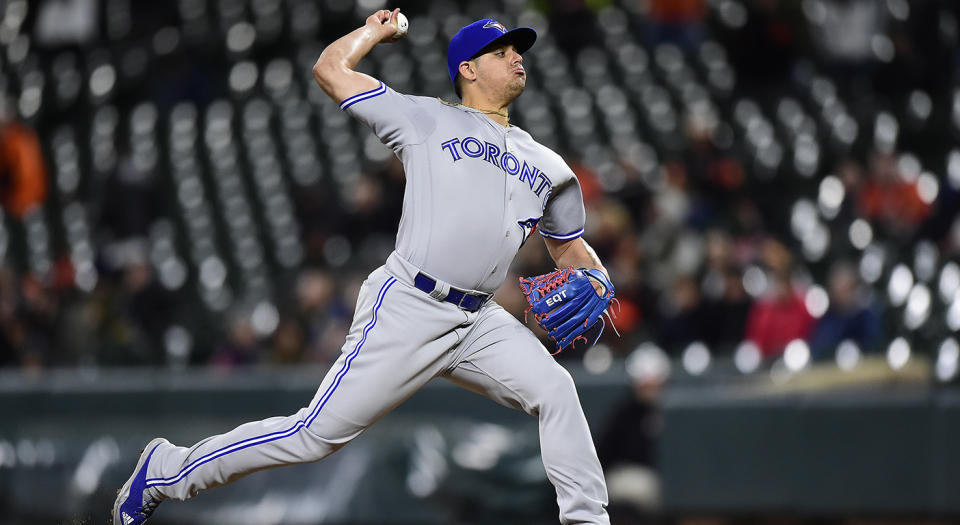Blue Jays win in Osuna trade, but share moral cost with Astros

When the Toronto Blue Jays traded Roberto Osuna to the Houston Astros on Monday, it looked like a clear win for the club.
Put as cynically as humanly possible the deal looks something like this: Toronto trades a depressed asset for an accomplished buy-low arm at the same position and a couple of intriguing young arms. The Blue Jays swap present wins for potential future wins at a time when present wins are of little value to them, while adding a player who mitigates the loss of Osuna on the field in Ken Giles.
Despite some high-profile blowups, there’s a pretty strong argument to be made Giles isn’t even a big downgrade. Since 2015, when Osuna came into the league, here’s how the two stack up:

Giles hasn’t been as good this year, but his velocity is still strong and he’s currently rocking a K-to-BB ratio of 31/3, so it’s seems pretty safe to assume he’ll be alright going forward.
That’s the bare-bones situation from a baseball standpoint, but it’s a disingenuous way to present it because the baseball aspect is window dressing. Although Ross Atkins said on Monday that the trade made sense from a “baseball perspective” it only happened because of factors that have nothing to do with what Osuna can do on the mound.
The Toronto Blue Jays wanted nothing more to do with Roberto Osuna, not because his remaining term wasn’t ideal for their competitive window, but because he was facing an assault charge and serving a 75-game suspension for violating MLB’s domestic violence policy.
On the surface, that almost seems like a noble idea. The Astros have been tabbed as the villains in this story for taking the 23-year-old on – and rightfully so. However, before the Blue Jays are awarded any gold stars it’s worth acknowledging the part they played in this tale.
The information surrounding Osuna’s May 8 arrest is not publicly known, but an MLB investigation deemed it worthy of a 75-game suspension. That’s significant. It’s also relevant that the Blue Jays know more than what’s out there. When assessing the situation from there, it’s a matter of “maybe’s”, and “probably’s”.
You can fit those words throughout however you see fit like a Mad Libs to suit your beliefs, but here’s what I would say: Osuna probably committed a truly foul act, unforgivable even depending on what you’re willing to forgive. The Blue Jays probably knew quite a few of the details. The word “allegedly “ has been and will continue to be overused in order to keep everyone safe legally, but it will also serve to sedate how we feel about the situation.
For argument’s sake, let’s say the Blue Jays know some ugly details about the incident involving Osuna. That theory certainly gels with Jon Morosi’s report that they never wanted him to pitch for their major-league club again:
Source: #BlueJays decided earlier this season that Roberto Osuna would not pitch for them again at @MLB level following the domestic violence incident. Blue Jays ownership and management decided to make the best trade they could. This was it. @MLBNetwork
— Jon Morosi (@jonmorosi) July 30, 2018
If that’s indeed a decision they came to, they could have just released Osuna then and there. They could have decided that keeping the young right-hander was morally reprehensible and taken a stand against his actions.
Instead, back in June, general manager Atkins infamously declared “Roberto is our closer.” With hindsight, that looks awfully like a dishonest attempt to disguise the Blue Jays’ plans for Osuna. You could make an argument that such a move was necessary for the club to maintain it’s leverage in trade talks. That would be a poor argument made by someone who doesn’t understand leverage, though.
Even if other teams know you are 100 percent set on moving a player, that doesn’t mean you won’t get a solid return. For example, the New York Yankees could have told the Blue Jays, “We know you’ll never let J.A. Happ play out his contract and leave for nothing, so we’re only offering you one Low-A prospect for him.” In response, the Blue Jays would say, “OK, we will trade him to the Cubs then.” As long as multiple teams are interested they can be played off one another.
We’ll never know what the Blue Jays would have gotten if they’d said from the get-go that someone else was free to give Osuna a second chance, but that they were moving on. But they sold a little bit of their soul for the difference between that and the package of Giles, Hector Perez and David Paulino.
Ultimately, the Blue Jays didn’t treat Osuna as someone they felt was unacceptable to keep or someone who had to be condemned – despite what they likely knew. Instead, they treated him as a PR problem that needed to be swept under the rug. That was strategic, and might have improved the talent they brought into the organization, but you could also call it spineless and cynical.
Following the Osuna trade, the Astros certainly look like the bad guys, but that definitely doesn’t make the Blue Jays the good guys.
More MLB coverage on Yahoo Sports:

 Yahoo Sports
Yahoo Sports 

